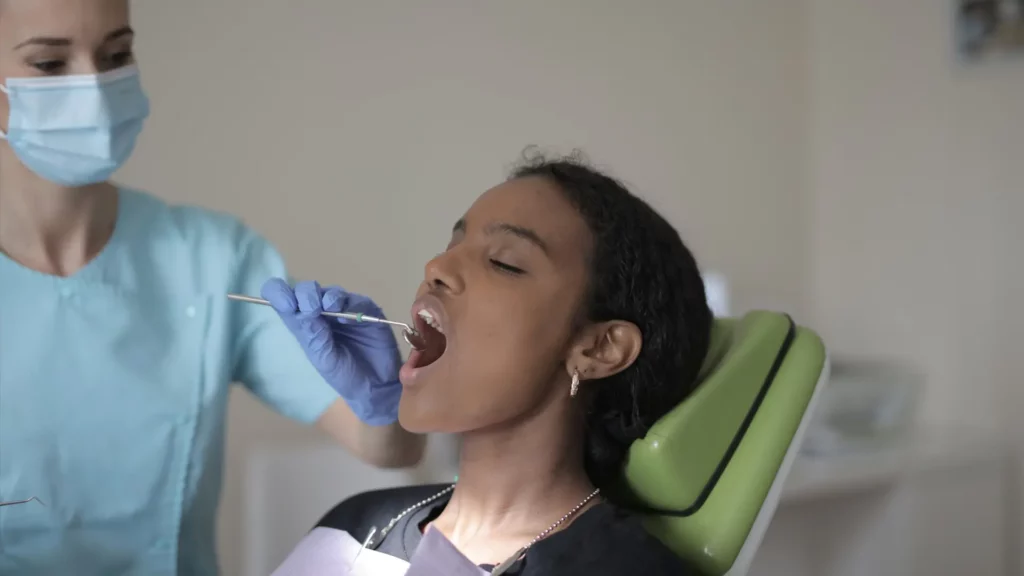The South African Dental Association recommends that most people should have dental cleaning at least twice a year.
However, the exact frequency may vary based on factors such as oral hygiene habits, medical conditions, age, diet, and personal needs.
Your dentist will be able to recommend a schedule of dental cleanings that are tailored to your specific needs.
If you have any concerns about your oral health or notice any changes in your mouth, it’s best to schedule an appointment with your dentist as soon as possible.
Importance of dental cleaning
Good oral hygiene is crucial for maintaining a healthy mouth and overall health. Regular dental cleaning is an essential component of a good oral hygiene routine.
Dental cleaning involves removing plaque, tartar, and other debris from the teeth and gums to prevent tooth decay, gum disease, and other oral health problems.
Factors that affect the frequency of dental cleaning
Oral hygiene habits
Your oral hygiene habits have a significant impact on the frequency of dental cleaning you need.
People who brush and floss regularly and avoid sugary and starchy foods tend to have less plaque buildup and require less frequent dental cleanings.
Medical conditions
Certain medical conditions, such as gum disease, can increase the frequency of dental cleanings.
People who have a history of gum disease, diabetes, or other medical conditions that affect oral health may require more frequent dental cleanings.
Age
As we age, our risk of developing oral health problems increases.
Older adults are more prone to tooth decay and gum disease and may require more frequent dental cleanings.
Diet
The diet also plays a role in the frequency of dental cleaning.
People who consume sugary and starchy foods and drinks regularly are at a higher risk of developing plaque and tartar buildup, which can lead to tooth decay and gum disease.
Individualized recommendations
Your dentist will be able to recommend a schedule of dental cleanings that is tailored to your specific needs based on the factors discussed above.
When to see a dentist
If you have any concerns about your oral health, or if you notice any changes in your mouth, such as red, swollen, or bleeding gums, it’s best to schedule an appointment with your dentist as soon as possible.
Benefits of regular dental cleanings
- Prevents tooth decay and gum disease Regular dental cleanings help remove plaque and tartar buildup, which can cause tooth decay and gum disease if left untreated.
- Maintains overall health Good oral hygiene and regular dental cleanings can help maintain overall health by reducing the risk of infections and other health problems that are linked to oral health.
- Helps detect oral health problems early Regular dental cleanings allow your dentist to detect any oral health problems, such as cavities or gum disease, in their early stages, when they are easier to treat.
In conclusion, regular dental cleaning is an essential component of good oral hygiene and overall health. Regular dental cleanings can help prevent tooth decay, gum disease, and other oral health problems.
Are there side effects of getting your teeth professionally cleaned more often?
Generally, there are no significant side effects of getting your teeth professionally cleaned more frequently.
However, in some cases, tooth sensitivity, gum discomfort, or minor bleeding may occur temporarily after a cleaning appointment.
If you experience any persistent pain or discomfort, it is best to consult with your dentist.
Overall, regular professional teeth cleanings are beneficial for maintaining good oral health.
What to do in between dental cleanings?
Here are some things you can do to maintain good oral health in between dental cleanings:
- Brush your teeth twice a day with fluoride toothpaste
- Floss daily to remove plaque and food particles from between your teeth and along the gumline.
- Use mouthwash to help kill bacteria and freshen your breath.
- Limit sugary and acidic foods and drinks, as they can cause tooth decay and erode enamel.
- Drink plenty of water to help rinse your mouth and prevent dryness.
- Chew sugar-free gum to stimulate saliva production and neutralize harmful acids in your mouth.
- Visit your dentist regularly for check-ups and cleanings, as recommended by your dentist.
- If you use tobacco products, consider quitting to reduce your risk of oral cancer and other health problems.
Dental health on overall health
Good dental health is closely linked to overall health.
Poor oral health can have negative effects on various aspects of your health, including:
- Cardiovascular health: Bacteria from gum disease can enter the bloodstream and increase the risk of heart disease and stroke.
- Respiratory health: Chronic gum disease can increase the risk of respiratory infections, such as pneumonia.
- Pregnancy and birth: Gum disease during pregnancy has been linked to low birth weight, premature delivery, and other complications.
- Diabetes: Poor oral health can make it more difficult to control blood sugar levels in people with diabetes.
- Mental health: Chronic oral pain and tooth loss can cause stress, depression, and social isolation.
- Overall wellness: Poor oral health can affect your ability to eat, speak, and smile comfortably, which can impact your overall quality of life.
It’s important to practice good oral hygiene and see your dentist regularly to maintain good dental health and reduce the risk of health problems related to oral disease.





